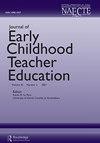在使用中测量知识如何在静态知识测量之外增加价值的探索性研究
IF 1.3
Q3 EDUCATION & EDUCATIONAL RESEARCH
Journal of Early Childhood Teacher Education
Pub Date : 2023-03-20
DOI:10.1080/10901027.2023.2192432
引用次数: 1
摘要
本文章由计算机程序翻译,如有差异,请以英文原文为准。
An exploratory study of how measuring knowledge-in-use adds value beyond static knowledge measures
ABSTRACT Research-supported knowledge about how children develop language is considered foundational for high-quality instruction and as such, measuring and developing teachers’ knowledge has been emphasized across the field of early childhood. However, there is a critical gap in understanding how this static knowledge gained through pre-service and in-service experiences is connected to enacted practice. To address this, we compared teachers’ static knowledge regarding language development as assessed via a traditional paper and pencil measure with their knowledge used in-the-moment during language interactions with children via stimulated recall interviews. Ten educators from a variety of early childhood programs completed the surveys and participated in two stimulated recall interviews about language interactions with children. Interview data were coded for emerging themes regarding knowledge use and then compared with the knowledge assessed on the static measure. We found that overall, teachers had high levels of research-based knowledge regarding children’s language development and that this knowledge was part of their in-the-moment knowledge use; however, it was used infrequently. Educators tended to utilize knowledge about their context more frequently than knowledge from the field (formal sources of knowledge). Implications for measuring knowledge, professional learning, and supporting the use of knowledge in practice are discussed.
求助全文
通过发布文献求助,成功后即可免费获取论文全文。
去求助
来源期刊

Journal of Early Childhood Teacher Education
EDUCATION & EDUCATIONAL RESEARCH-
CiteScore
2.20
自引率
16.70%
发文量
27
期刊介绍:
The Journal of Early Childhood Teacher Education, the official journal of the National Association of Early Childhood Teacher Educators, publishes original manuscripts, reviews, and information about association activities. Its purpose is to provide a forum for consideration of issues and for exchange of information and ideas about research and practice in early childhood teacher education. JECTE welcomes research reports, position papers, essays on current issues, reflective reports on innovative teacher education practices, letters to the editor and book reviews.
 求助内容:
求助内容: 应助结果提醒方式:
应助结果提醒方式:


